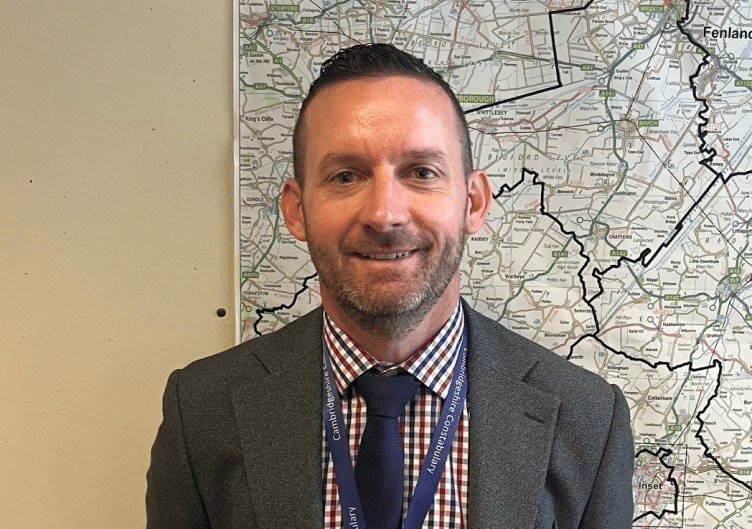
Detective Chief Inspector Leigh Allman
A Cambridgeshire Police Federation member says work to improve the recruitment and retention of detectives is making real progress.
Detective Chief Inspector Leigh Allman has spoken about the positive impact that changes in the Force are having.
“We are heading in the right direction,” he said. “We’ve put some really good structures and processes in place.
“Recruitment and retention is better than it has been in the past but there’s still work to do.”
Leigh has been leading the Force’s work on recruitment and retention for the past four years.
Leigh said that focus groups held in 2020 identified issues that prevented people coming into CID and led to them leaving.
“What we found wasn’t necessarily the things we thought it would be, such as shift patterns,” he said. “We used the results as a platform to develop changes and a new approach.”
Leigh said that one of the biggest issues identified was ongoing training and continuous professional development (CPD) for detectives.
“When you start as a detective there is significant investment in you because you have to complete the Professionalising Investigations Programme (PIP),” he said.
“But once they finished that there was minimal CPD on offer. This was highlighted as a significant issue for both recruitment and retention.”
The Force has created a CPD unit for detectives, as well as for student officers. The team of a detective sergeant and four detective constables co-ordinate CPD events for all detectives, from DCs through to DCIs.
It is also responsible for all PIP accreditation and maintenance assessing officers against the criteria, supports trainee detective constables (TDCs) in the workplace which includes supporting interviews and crime management.
And the team has created a mentor training programme bespoke to CID with around 50 trained mentors.
“It’s having an impact on recruitment and retention,” Leigh said.
“We’ve had a number of emails saying that the coaches have made a real difference to people and if it wasn’t for their support then they may have left CID.
“Our performance around PIP and getting the PIP portfolios completed and maintained has significantly improved.
“At a time when we have a number of vacancies, the Force has invested by putting four detectives into the CPDU when we’ve got gaps elsewhere, and that reinforces the importance of what they do. The added value they bring is significant.
“The feedback around them has been really positive.”
Leigh said the training programme is a huge benefit to individual officers and the Force as a whole.
“There’s a considerable investment from the Force across all the training that is given,” he said.
“With regional teams you can get a lot of experience move into specialist teams elsewhere, so locally it’s really important to invest in training for people as they come in.
“We’re trying to make sure we have a sufficient spread of skills across the Force so it isn’t all in specialist teams. The challenges faced by local CIDs has changed and we need to adapt with it by having people in the right skills in the right place’
Other changes include the Sherlock Investigator Development Programme.
The first phase sees every new recruit given a week’s crime training with input from subject matter experts.
“It’s based on a case study that runs through the week,” Leigh said. “That’s to improve investigation standards in probationary constables and to get people interested in the detective pathway.”
It’s followed by case file building and disclosure ‘which provides them with the skills and confidence to take cases to court’.
And then there are optional six-month structured attachments to CID.
“It’s a feeder into CID,” Leigh said. “People get to try it out and if they like it they can stay and apply for the TDC process’.
“Over time this has proven a successful way of bringing people in.”
Alongside that the Force has its TDC process, which has undergone changes with a move away from formal sit-down interviews to more practical assessments.
These include assessments of their investigative mindset, how they approach an investigation, and a discussion with a senior investigating officer about that.
The Force CID also recruits external transferees.
“We’ve made changes to that process after taking feedback from transferees,” he said.
“So when they arrive they will have a five-day induction to get them up to speed and build confidence.
“The third route in is through an accelerated detective constable programme.
“We’ve just started our eighth cohort of accelerated detectives.
“We only started that three or four years ago and it’s been very successful in bringing people in.”
Leigh added: “There’s a lot of really good work happening.
“We are in a much better position with our structures, but we know there’s still work to do to reduce the vacancies we have.”
Superintendent John Massey, head of crime, said: “Investigator recruitment and retention is inextricably linked to our welfare provision, our working environments and ultimately to performance. That’s why we are addressing this challenge in as broad a way as possible.
“As well as finding new ways to reach out to potential recruits, we’re seeking to build in long-term success by continually reviewing and improving our structure, environment and outcomes.
“This is how we will encourage people to join and stay in the profession: keeping workloads manageable and providing a positive, successful workplace where we listen and respond to feedback.
“Leigh’s team are doing a brilliant job with this holistic, and farsighted, approach to recruitment.”
